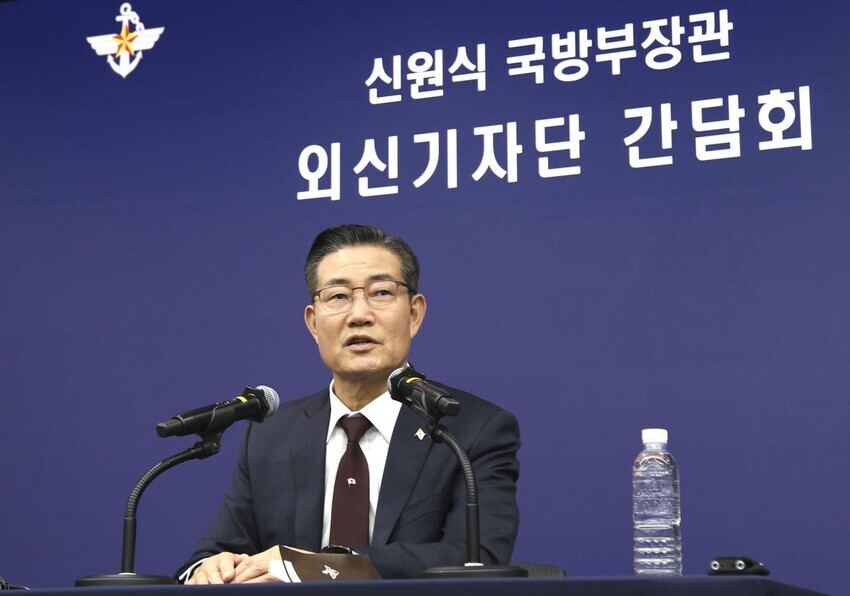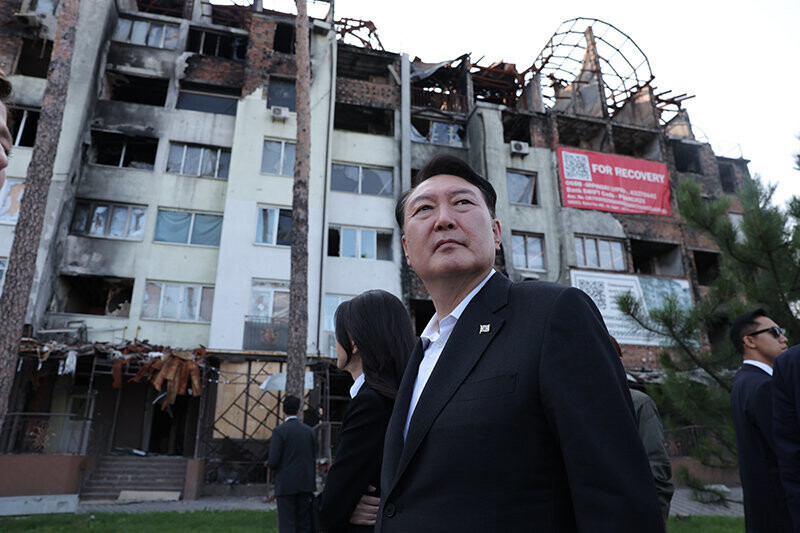hankyoreh
Links to other country sites 다른 나라 사이트 링크
Korean defense chief claims remark in favor of ‘full support’ to Ukraine was mistranslated

South Korea’s defense minister said that a January interview in an English-language newspaper quoting him as saying that Ukraine should be given “full support” was mistranslated in a way that did not take the context into account.
The South Korean and Russian foreign ministries exchanged heated words after the remarks were published. Analysts speculated that Defense Minister Shin Won-sik’s explanation was meant to manage relations between Seoul and Moscow in the wake of Vladimir Putin’s election for a fifth term as Russian president.
Speaking with representatives of the foreign press on Monday at the Korea Press Center in Seoul, Shin said, “The translation was extremely incorrect in saying that I thought we should provide full support to Ukraine.”
“It appeared to be skewed wording that did not take the surrounding context into account,” he added.
“What I talked about was not ‘full support to Ukraine,’ but active assistance in terms of the need to be more proactive,” he explained.
He went on to say, “Even that remark was something I said when I was a National Assembly member, and when the reporter asked if my views had changed since becoming a Cabinet minister, I said, ‘Personally, like when I was a National Assembly member, I would like to see more proactive support.’”
In an interview published on Jan. 24 in an English-language Korean newspaper, Shin was quoted commenting on the South Korean government’s restriction of assistance to Ukraine to humanitarian and financial areas.
He replied that he stood by the South Korean government’s policy but that he personally saw “full support as the way to go as a member of the free world.”
On Jan. 26, Russian Foreign Ministry spokesperson Maria Zakharova said, “We would like to warn Seoul against taking impulsive actions that may lead to a complete deterioration of what were once friendly relations with Russia.”
On Jan. 28, the South Korean Ministry of Foreign Affairs fired back by “advising that Russia’s demeanor will play an important role in the management of South Korea-Russia relations going forward.”
Zakharova subsequently made the unusual move of singling President Yoon Suk-yeol out for direct criticism. On Feb. 3, South Korea’s Foreign Ministry condemned this as “hateful sophistry” and summoned the Russian ambassador in South Korea to complain.
Analysts suggested that Shin’s explanation claiming his remarks had been distorted was influenced by the recent souring of relations between Seoul and Moscow, as seen with Russia’s recent announcement of the detention of a South Korean national on espionage charges.
On Tuesday, Shin stressed that the Yoon administration remained unchanged in its approach of not providing Ukraine with lethal weapons. When asked about the provision of ammunition to Ukraine, he explained that “as the United States partially lacked shell reserves, we made exports to them.”
Shin said that South Korea “[has] never directly provided lethal weapons, equipment or supplies to Ukraine.”
“Unless our government's stance changes, this policy remains in effect,” he reiterated.

Shin also drew some attention with remarks stating that the truth of the Bucha massacre, where Russia is alleged to have killed Ukrainian civilians, had yet to be definitively proven. Ukraine has claimed that Russian troops massacred Ukrainian civilians in the Bucha region in late March 2022 before retreating, while Russia has denied this.
When asked about this, Shin said, “Since [the Bucha massacre] has yet to be conclusively proven to be a fact, it would not be appropriate for me to give an assessment, but the Republic of Korea condemns actions such as illegally invading and continuing to bomb civilian facilities.”
On July 15 (local time) of last year, Yoon and first lady Kim Keon-hee visited the city of Bucha and commemorated victims there.
In reference materials at the time, the presidential office described the massacre as a “symbol of the brutal acts perpetrated by the Russian military.” Explaining the significance of the Bucha visit, an official with the presidential office said, “This is the first time that a South Korean president has visited a battlefield — as opposed to a location where South Korean troops have been dispatched — as a gesture of solidarity as a responsible member of the international community.”
Observers are now watching to see Russia’s response to Shin’s remarks as a senior South Korean foreign affairs and national security official commenting to the foreign press that the Bucha massacre has yet to be definitively confirmed as factual.
By Kwon Hyuk-chul, staff reporter
Please direct questions or comments to [english@hani.co.kr]

Editorial・opinion
![[Column] Season 2 of special prosecutor probe may be coming to Korea soon [Column] Season 2 of special prosecutor probe may be coming to Korea soon](https://flexible.img.hani.co.kr/flexible/normal/500/300/imgdb/original/2024/0426/3317141030699447.jpg) [Column] Season 2 of special prosecutor probe may be coming to Korea soon
[Column] Season 2 of special prosecutor probe may be coming to Korea soon![[Column] Park Geun-hye déjà vu in Yoon Suk-yeol [Column] Park Geun-hye déjà vu in Yoon Suk-yeol](https://flexible.img.hani.co.kr/flexible/normal/500/300/imgdb/original/2024/0424/651713945113788.jpg) [Column] Park Geun-hye déjà vu in Yoon Suk-yeol
[Column] Park Geun-hye déjà vu in Yoon Suk-yeol- [Editorial] New weight of N. Korea’s nuclear threats makes dialogue all the more urgent
- [Guest essay] The real reason Korea’s new right wants to dub Rhee a founding father
- [Column] ‘Choson’: Is it time we start referring to N. Korea in its own terms?
- [Editorial] Japan’s rewriting of history with Korea has gone too far
- [Column] The president’s questionable capacity for dialogue
- [Column] Are chaebol firms just pizza pies for families to divvy up as they please?
- [Column] Has Korea, too, crossed the Rubicon on China?
- [Correspondent’s column] In Japan’s alliance with US, echoes of its past alliances with UK
Most viewed articles
- 1‘We must say no’: Seoul defense chief on Korean, USFK involvement in hypothetical Taiwan crisis
- 2AI is catching up with humans at a ‘shocking’ rate
- 3S. Korea “monitoring developments” after report of secret Chinese police station in Seoul
- 4The dream K-drama boyfriend stealing hearts and screens in Japan
- 5[Column] Can we finally put to bed the theory that Sewol ferry crashed into a submarine?
- 6[Editorial] Yoon cries wolf of political attacks amid criticism over Tokyo summit
- 7Doubts remain over whether Yoon will get his money out of trip to Japan
- 8[Photo] “Comfort woman” survivor calls on president to fulfill promises
- 9[Editorial] Was justice served in acquittal of Samsung’s Lee Jae-yong?
- 10Is N. Korea threatening to test nukes in response to possible new US-led sanctions body?